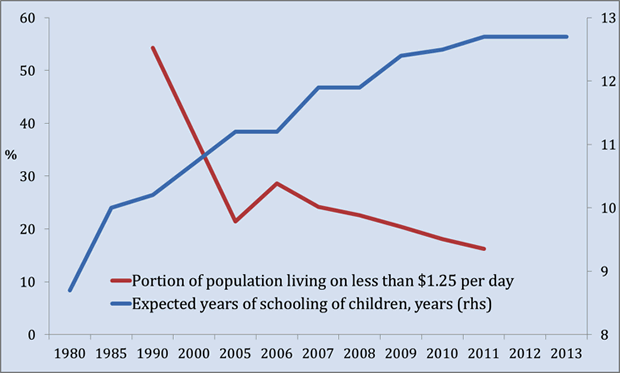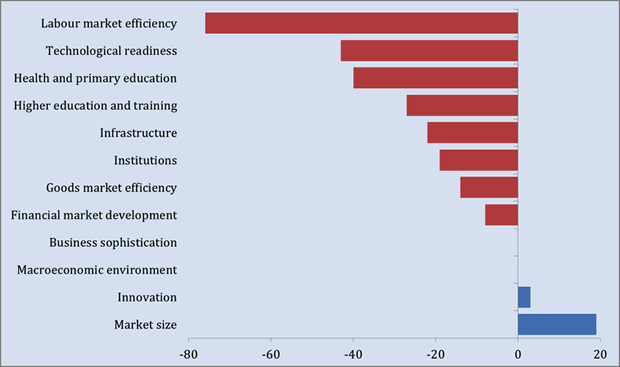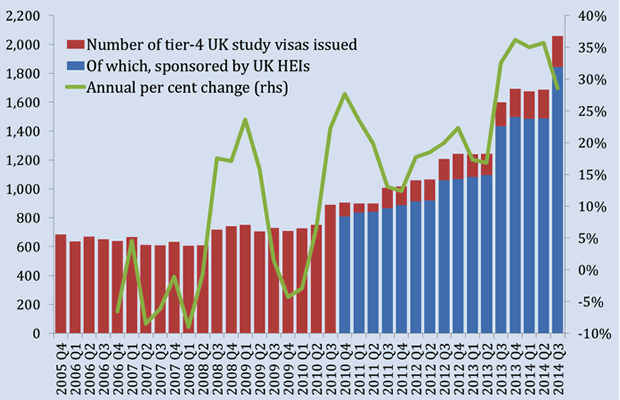Indonesia is the world’s fourth largest country by population, the 16th largest economy and one of the most rapidly growing student markets for UK education. Rising living standards have made international education a possibility for more households than ever before in Indonesia, and this relatively untapped education market has in turn begun to attract the attention of a growing number of UK institutions.
Indonesia, however, presents a number of challenges for the UK. The local education system lacks capacity – from pre-school to tertiary levels – and basic knowledge of the UK offer remains low among many local education stakeholders. While opportunities exist in Indonesia to drive student recruitment to the UK and build institutional partnerships, the UK sector would be well advised to keep in mind the unique political, social and economic contexts in Indonesia.
Benchmarking Indonesia
For the first time in its history, Indonesia witnessed the transfer of power from one popularly elected official to another in October 2014. The new president, Joko Widodo (popularly known as Jokowi), is a political outsider, raising both expectations for his reform agenda and potential obstacles from entrenched interests in the country’s ruling class. Despite his landmark victory, parties loyal to Jokowi account for only 37 per cent of the seats in the legislature (and 41 per cent of votes), suggesting that the reforms which Indonesia so badly needs may be hard to come by. In the first months of his administration, however, some significant changes have already taken place which shed some light on what may be in store for education.
In the most significant reform of his early administration, Jokowi has moved to eliminate wasteful fuel subsidies. This reform along could save the government upwards of $8-10bn in annual revenue that can now be invested in healthcare and education1, but it risks angering the public, particularly if global oil prices rise. The decades-old fuel subsidy system was forecast to account for 13 per cent of total government expenditure in 2015, but has now been reduced to one per cent. This reform will help encourage foreign investment and signals that the Jokowi administration is able to push through politically difficult reforms despite considerable opposition.
In the education sector, the Jokowi administration has also moved to change the ministerial oversight structure. While primary and secondary education remain under the control of the Ministry of Education and Culture, higher education has been moved to sit with the Ministry of Research, Technology and Higher Education2. This reform signals the government’s desire to improve the links between higher education and industry, and it raises hopes that local higher education institutions will boost research output, in which Indonesia currently ranks last among all 50 countries assessed in the U21 Ranking of National Higher Education Systems in 2014. Closer industry links may also spur local HEIs to improve learning outcomes in order to boost graduate employability, another government priority.
These reforms to higher education come not a moment too soon for Indonesia, as rapid economic growth in recent years has masked a worrying overreliance on natural resource extraction3. With the drop in global prices of many of Indonesia’s chief exports, driven in part by falling oil prices and slowing demand from China, Indonesia needs to seek new sources of growth now more than ever. For all of its potential – favourable demographics, abundant natural resources and a strategic location in the global supply chain – the country will need to undergo considerable reforms in order to prepare its labour force for the skilled jobs of the future that will generate more sustainable growth.
Over the last two decades, Indonesia has made great progress in lowering its poverty rate, while also increasing educational attainment levels. While more remains to be done in raising living standards and improving access to education – particularly in more remote areas – Indonesia’s next phase of development will depend on increasing the quality of the education that Indonesian students receive once they enter the classroom.
Poverty falling, education attainment rising
Source: UNESCO, World Bank
Indonesia is distinguished above all by its size, with the world’s fourth largest population, which is spread across a country containing some 18,000 islands – nearly one thousand of which are permanently inhabited. Given the sheer size of the country, as well as its geographic dispersion, it is not too surprising that living standards and education outcomes continue to lag behind developed countries by a considerable margin.
Despite recent progress in closing the development gap, the country still faces a daunting list of challenges – a rigid labour market, lack of technology, and weak infrastructure and institutions among them. Perhaps the most important obstacle to boosting long-term competitiveness though is the country’s human capital stock, which not only trails the developed world but also much of the surrounding East Asia region. Boosting worker productivity will require greater investment in education at all levels, where Indonesia continues to suffer from poor performance on a number of international metrics.
Where Indonesia over-/under-performs its overall global competitiveness rank
Source: Global Competitiveness Report 2014/15, World Economic Forum
Indonesia’s aggregate higher education system ranks near the bottom of the 50 countries in the U21 rankings, outperforming only India and Iran in its overall score. In terms of both education spending and research output, its higher education institutions rank dead last. Improving the quality of higher education in Indonesia is an explicit policy of the government.
At secondary levels, Indonesia does not perform much better, with 15-year-olds scoring far below their peers in neighbouring countries on the 2012 PISA exam. Admittedly, this is a tough neighbourhood in which to compete, with countries in East Asia accounting for the top six scores on the international standardised test and only three of the 11 participating countries in the region scoring below the OECD average. However, Indonesia’s students ranked last in all three subjects in East Asia, trailing significantly behind countries such as Vietnam, which has similar levels of economic development but boasts far better exam results. On at least one measure, however, Indonesia is a star in East Asia – outbound student mobility to the UK is growing by leaps and bounds, while much of the rest of the region is set to slow in the coming years.
Student Mobility
Australia and the U.S. have been the traditional beneficiaries of Indonesian students studying in major destination countries, but enrolment in these two markets has remained largely stagnant in recent years. Australia’s large market share in particular has begun to shrink in recent years, with new enrolments in higher education declining every year from 2009-134.
In contrast, the number of Indonesia’s students electing to enrol in higher education in the UK has grown briskly since 2007/08, more than tripling by 2013/14, albeit from a small base. More encouragingly, early indications are that UK market share has continued to grow through 2014/15 based on the latest UK study visa data released by the Home Office. In fact, the number of long-term UK study visas issued to students in Indonesia has expanded more than 28 per cent in the last year, making it one of the fastest growing international markets for UK education outside of Brazil.
Mobility from Indonesia to UK education is on the rise
Source: Home Office, British Council SIEM; data represents 12-month rolling sum;
annual per cent change refers to change over previous year
While U.K. market share remains relatively modest in size, Indonesia represents one of the strongest recent growth stories in UK higher education. This is particularly true as the broader East Asia region is facing a growth slowdown in inbound mobility to the UK. In 2013/14, more than 12 per cent of all higher education enrolments from Indonesia in the four major host destination markets were in the U.K., up from less than 10 per cent the year before5.
Continuing to grow UK market share will require the UK to market itself more proactively in Indonesia. According to recent British Council interviews with education agents and high school career counsellors, one of the major challenges faced by the UK is a perception of both physical and cultural remoteness. This places the UK at a distinct disadvantage not only with respect to neighbouring Australia, but also with other host destination markets in the region such as Singapore and Malaysia. While the UK is recognised as offering superior quality, these neighbouring destinations offer cultural familiarity, strong immigrant networks and greater ease for visiting parents.
One of the primary causes of historically low UK market share in Indonesia is the lack of familiarity with UK education among agents, career counsellors and parents. Local counsellors and agents report lacking basic knowledge such as how to apply to UK institutions, what articulation pathways exist for Indonesian students and the unique selling points that distinguish UK education from other top destination markets. Therefore, the challenge for UK institutions in boosting enrolment from Indonesia lies in promoting not only their own institutions, but also the UK in general.
For Indonesian parents, overseas education is rarely an end in itself; rather, it is a means to increase prestige, build networks and improve career prospects for their children. It is not unusual for parents in any country to expect a return on their investment in overseas education; Indonesian parents, however, expect it immediately in the form of higher graduate salaries or work experience through internships. Despite these high expectations, parents and students in Indonesia frequently approach agents with little idea of what subject to choose, relying on the advice of perfect strangers for often life defining decisions. For UK institutions recruiting students in Indonesia, it is important to understand both the high hopes of parents and their children, as well as the anxieties and uncertainty that accompany overseas study.
Government Policy and Priorities
The government agency that is often most familiar to UK institutions is the Indonesian Directorate General of Higher Education (DIKTI), which administers a scholarship scheme for local academic staff to study abroad and maintains a quota of 150 spots at UK universities. DIKTI’s list of programmes extends well beyond this scholarship, however, with responsibilities to improve the overall quality of higher education in Indonesia, train higher education professionals and foster links between local HEIs and industry.
DIKTI is particularly supportive of programmes that promote the study of science, technology, engineering and medicine (STEM) subjects, bolster research links with priority industries, and raise the quality of education provision in less developed areas of Indonesia. Greater internationalisation of Indonesian higher education is also a key development priority, including promotion of dual degrees between local and foreign HEIs.
The DIKTI scholarship for academics is henceforth to be administered by the Indonesian Endowment Fund for Education (LPDP), which is jointly funded by the Ministry of Finance, Ministry of Education and Culture, Ministry of Research, Technology and Higher Education, and Ministry of Religious Affairs. The LPDP also administers its own student scholarship programme which is open to the public and has funded the overseas study of 4,580 students since 2013. This LPDP scholarship nominally requires scholarship recipients to enrol at one of the top 200 universities in the world, but the LPDP has begun to place greater emphasis on tuition fees and graduate outcomes, particularly alumni services, in selecting eligible overseas institutions.
The lack of high quality provision in local HEIs is driving demand for overseas education. Only 11 HEIs in Indonesia have been granted autonomous legal status by the government, and nearly all of Indonesia’s universities lack sufficient funds to conduct their own research. With the government also investing comparatively little in research, the need for universities to fill the gap is even greater.
In 2014, Indonesia spent an estimated 0.2 per cent of GDP on R&D6 – a paltry sum. For comparison’s sake, Indonesia’s economy is roughly one third the size of the UK’s at market exchange rates, but it spends less than one fifteenth of the UK’s annual expenditure on R&D. Perhaps not surprisingly, Indonesia ranks last among 50 countries in terms of research output on the U21 rankings, and Indonesia also ranked last among 40 countries in total R&D spend in 20147.
Quality assurance in Indonesian higher education is also not what might be expected in a country of its size. While a system exists, it involves self-assessments on the part of institutions, and focuses on meeting minimum standards as opposed to striving for improved quality.
One measure that is intended to improve education quality in Indonesian higher education is a new requirement that university lecturers possess at least master’s degrees. This change is slated to go into effect this year, and teaching staff who do not meet this new requirement will be limited to administrative duties. This measure is one of the key drivers in increased demand for postgraduate education overseas, although low salaries of academic staff who are looking to upgrade their qualifications are largely reliant on scholarship programmes to fund their studies overseas.
The last decade has also seen a rapid increase in the number of private HEIs, partly in response to the lack of quality and capacity in the public sector. Property developers have shown particular interest in opening private colleges and universities, which typically import their curriculum and alter it to fit local needs. Most courses at private HEIs focus on less cost intensive social science and business studies courses, which are not meeting the most urgent needs of local industry.
Partly in response to the growth in private higher education, DIKTI and LPDP have begun to encourage dual degree programmes in which certificates are awarded by both the Indonesian and foreign partner. These joint programmes usually involve a period of study in each country, and are mainly seen as a vehicle to boost the capacity of local higher education while also giving local students a more cost effective means of receiving overseas qualifications. For the time being, however, branch campuses are forbidden, meaning that UK institutions with aspirations of delivering transnational education (TNE) in Indonesia will need to seek local partners and ideally target priority development subjects.
The Next Frontier
Indonesia offers both the allure of a largely untapped student market and a higher education landscape that is hungry for joint partnerships. At the same time, Indonesia presents considerable challenges including low human capital stock, regulatory uncertainty, underdeveloped HEIs and a lack of research funding. Taking full advantage of the opportunities that Indonesia offers UK institutions will therefore require not only a strong awareness of local market conditions and government priorities today, but also a long-term vision and considerable investment going forward.
While Indonesia’s student market may be the next big thing in international education, UK institutions should look to measure their impact not in years, but in decades. This will call for a multi-pronged strategy that manages to boost student recruitment in the short run, build lasting local partnerships in the medium run and help Indonesian higher education institutions emerge on the international stage in the long run.
British Council’s Services for International Education Marketing (SIEM) team helps UK institutions refine their internationalisation strategies to succeed in East Asia and around the globe. Please get in touch if you would like to learn more.
Steven Corry
Regional Head of Business Development, SIEM East Asia
steven.corry@britishcouncil.org.hk
Meinanda Chudahman
Senior Programme Manager, SIEM Indonesia
meinanda.chudahman@britishcouncil.or.id
Jeremy Chan
Head of Research and Consultancy, SIEM East Asia
jeremy.chan@britishcouncil.org.cn
1 http://www.bloomberg.com/news/2014-12-31/widodo-makes-biggest-change-to-indonesia-s-fuel-subsidy-system.html
2 Islamic HEIs will remain under the control of the Ministry of Religious Affairs.
3 Indonesia’s top five export products: coal, petroleum gas, palm oil, crude petroleum and rubber.
4 Australian Trade Commission
5 Source: Australia (AEI), Canada (CIC), U.S. (IIE) and U.K. (HESA); data refers to total enrolments in higher education except for Canada, which only reports all international students present on December 31.
6 2014 Global R&D Funding Forecast, Battelle; note: this figure is reported in purchasing parity terms, so the nominal figure is likely less than 0.2 per cent.
7 Ibid
